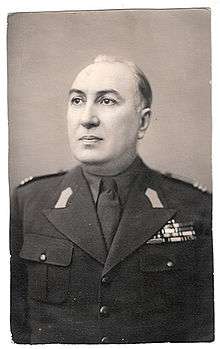Constantin Tobescu
Constantin Tobescu (1893 – 1951) was a Romanian general of the Romanian Gendarmerie (Jandarmeria) during World War II, deserter on August 23, 1944, one of the principal executors of Antonescu's racial purity policies.

He died in the Târgu Ocna prison in 1951.
Youth and studies
Constantin Tobescu was born on January 28, 1893 in the village of Comani, Olt County, Romania. In 1911, after completing 7 years of high school, Constantin Tobescu enrolled in the Military School for Infantry, which he completed in 1913, being promoted 2nd lieutenant. He immediately took part in the operations of the Second Balkan War.
The First World War
In 1916, a short time after he had been promoted to the rank of lieutenant, Romania entered World War I. He was in command of a Company when he was wounded on September 4, 1916 but returned to the front line in December of the same year. In 1917 he was promoted Captain and was awarded the Coroana României Order with swords.
Career in the Romanian Gendarmerie
At the end of the war, on December 19, 1918, Constantin Tobescu was transferred to the Gendarmerie and appointed commander of the company of Romanaţi County. In 1920 he received special training in gendarmerie procedures, following which he was permanently transferred to the Gendarmes' Corps and promoted major.
In 1929, the Romanian Gendarmerie was reorganized and Constantin Tobescu moved to the Gendarmerie Inspectorate of Bucharest. During the 1930s he held various responsibilities, being also in charge of international contacts with the Gendarmerie corps of friendly nations. He was promoted lieutenant-colonel in 1932 and colonel in 1938.
On September 4, 1940, when general Ion Antonescu took power, Constantin Tobescu was appointed to the General Inspectorate of the Gendarmerie. However, because of his conflict with the legionnaires of the right-wing Iron Guard he resigned on December 31, 1940 and took refuge in Yugoslavia, returning to Romania on January 24, 1941, after the quelling of the Legion's coup attempt.
World War II
On June 22, 1941, when Romania entered World War II, Tobescu was recalled to active duty. His responsibilities were focused on the execution - as one of the principal executors - of Antonescu's racial purity policies: deportation to Transnistria of 25 000 of Roumanian Romani people (11 000 deaths, most of them children),[1] massacres (1941 Odessa massacre), concentration camps for members of the Romanian Jewish community, etc. For exemplify, in October 1941, the Romanians established a detention camp in Vapniarka. One thousand Jews were brought to the site that month, mostly from the city of Odessa. Some two hundred died in a typhus epidemic; the others were taken out of the camp in two batches, guarded by soldiers of the Romanian Gendarmerie, and shot to death.[2][3][4][5][6][7][8]
While his initiatives to prevent sabotage were mostly successful, he is also remembered for the special treatment he gave American and British paratroopers that were captured in Romania. He organized special camps where they were treated as prisoners of war, refusing to hand them over to the Germans, or even to allow them to be interrogated by the German authorities.
He was involved in Operation Autonomous when a special group of 3 British secret agents were parachuted in Romania in 1943. In order to protect them, he made arrangements to have them kept in an apartment in the building of the Romanian Gendarmerie, under his own special protection, putting his subordinate, lieutenant-colonel Constantin C. Roșescu (then a Major) in charge as special liaison agent. The two officers conveyed the information which the agents had brought to their destination and concealed their presence from the Germans. The agents were released immediately after August 23, 1944, when Romania switched sides (see King Michael's Coup).
The trial
Tobescu was judged by the Bucharest Military Tribunal on January 19, 1949, for war crimes and desertion in time of war and found guilty of the charges, convicted to 5 years detention and stripped of all military ranks and honours for 5 years. After the appeal, the conviction was increased to 10 years.
Decorations and awards
- Commander of the Order of the Crown (Romania) (previously Officer (23 January 1933), Knight with Swords (3 July 1918))
- Officer of the Order of the Star of Romania (previously Knight)
- Commemorative Cross of the War 1916-1919
- World War I Victory Medal
- Medal for 25 Years of Service
- Medical Merit Cross
- Commander of the Order of Military Merit (Bulgaria)
- King Carol I Centennial Medal
- Order of Agricultural Merit
References
- Achim, Viorel: The Antonescu Government’s Policy towards the Gypsies, in Ionescu, Mihail E. and Liviu Rotman, Liviu (eds.): The Holocaust in Romania: History and Contemporary Significance pp. 55-60, Bucharest, 2003.
- (in Romanian) Antonescu and Transnistria (1) Archived 2008-03-02 at the Wayback Machine
- (in Romanian) Antonescu and Transnistria (2) Archived 2008-03-02 at the Wayback Machine
- (in Romanian) Odessa-1941. Onoarea pătată a Armatei Române Archived 2013-09-27 at the Wayback Machine
- (in Romanian) Duțu A., Retegan M.: Război și societate, vol. 1, RAO, 2000
- (in Romanian) Ancel, Jean: Contribuții la Istoria României. Problema evreiască 1933-1944 ("Contribution to Romanian History"), vol. I, pp. 111-142, București, 2001,
- (in Romanian) Ioanid, Radu: Holocaustul în România. Distrugerea evreilor și romilor sub regimul Antonescu 1940-1944 (The Holocaust in Romania, pp. 138-166 & 263-330, București, 2006.
- (in Romanian) Achim, Viorel & Iordachi, Constantin (coord.): România și Transnistria: Problema Holocaustului. Perspective istorice și comparative, pp. 201-233, București: Curtea Veche, 2004.
- Porter - "Operation Autonomous: With SOE In Wartime Romania" Chatto and Windus. 1898
- Alesandru Duţu, Florica Dobre, Andrei Şiperco - "Pagini dintr-o istorie nescrisă: 1941-1945. Prizonieri de război în România" , in Magazin Istoric, March 1997
- Dr. ing. Alexandru Racovitză - "Mărturii despre Operaţiunea Autonomus", in Clopotul Bucovinei nr. 16(42), 2007
- Aurel Pippidi - Regele şi ţara - Revista 22, 2006